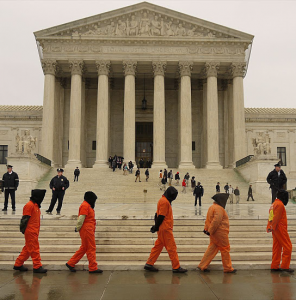Marking the 10th Anniversary of Guantanamo

By Eric Nguyen
January 11th marked the ten year anniversary of Guantanamo. For humanists and other human rights activists, this has been ten years too many. Despite revelations of abuse and torture, along with substantial evidence that detainees are innocent (in fact, over half of the detainees have been cleared for release), little have been done to free the 171 prisoners. And no one is schedule to leave.
Over New Year’s Eve, President Obama signed the National Defense Authorization Act (NDAA), which includes provisions for indefinite detention, despite promises to veto it. He did so despite serious reservations as acknowledged in signing the statement.
Since then, many activists have increased pressure both within the legal system and through public demonstrations, as was the case on January 10th and 11th in Washington, DC. Spearheaded by Debra Sweet, director of World Can’t Wait and the 2012 Humanist Heroine of the AHA, hundreds gathered to show public support for the release of the 171 prisoners.
Meeting at the popular DC venue Busboys and Poets, the film Outside the Law, directed by Andy Worthington, was shown. Detailing the history of the war on terror, the film lays bare the crimes against humanity at the Cuban camp: from the September 11th attacks, the birth of the “War on Terror,” and the government’s eventual birth of the Guantanamo prison, where hundreds of suspected terrorists from around the world—from Yemen to the United Kingdom—were detained and tortured without trial, both at Guantanamo and aboard. These prisons, including Abu Ghraib, were considered foreign to the U.S. and thus neither constitutional rights nor those in the Geneva Convention were applicable.
Despite already releasing or transferring 600 prisoners, 171 are still detained without fair trial and with little compelling evidence for incrimination. “The evidence is laughable,” said a lawyer working on several prisoner cases during a discussion after the movie’s showing, though he could not say more. The panel was made of lawyers and activists, as well as the film’s director himself.
The panel reviewed recent and upcoming strategies to free the prisoners, hold the government accountable for its actions, and educate the public about these crimes against humanity. “Most people don’t know what’s happening at Guantanamo. Some even want more prisoners,” said an activist, pointing to the fact that many Americans are unaware of the controversy.
There was a general consensus that due to multiple failures in using the court system to free the prisoners, the public might have more luck in pressuring the administration to act. Activists outside the court also have the opportunity to educate a misinformed public.
Dressed in orange jumpsuits and black bags over their heads, on January 12th, World Can’t Wait and other activists held a rally at the White House, chanting, “What do we want? Human rights! When do we want it? Now!” and “We are unstoppable! Human rights are possible!”
“We must stand up to the crimes of the government done in our name,” said Sweet, a pioneering anti-war voice, who first caught public attention in 1970 for standing up to President Nixon and his stance on the Vietnam War. World Can’t Wait seeks to end war and torture as well as theocracy in American politics.
Among other efforts to educate the public and pressure the government into discussing the injustices at Guantanamo is www.closeguantanamo.org which calls for the immediate closure of the prison, via the White House petition, We the People. If the petition receives the 25,000 required signatures, a White House official would have to respond to it. With over 24,000 signatures already, there is plenty of support—and surely among them many humanists—to end this dark chapter of American history.
Eric Nguyen is the grassroots coordinator for the American Humanist Association.
